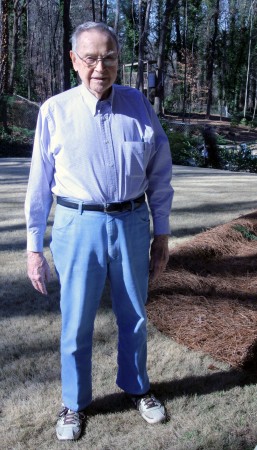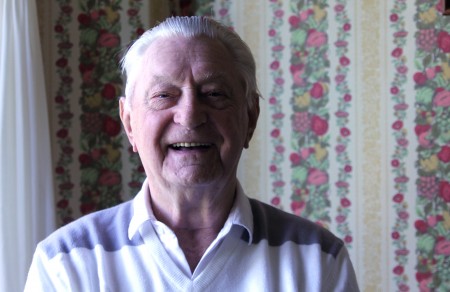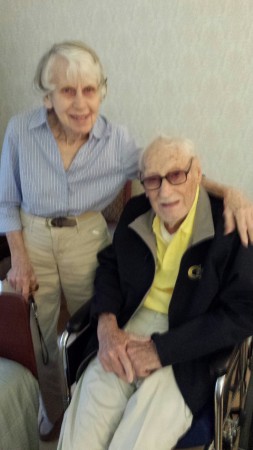By Bill Hendrick
You don’t have to see many dead bodies sprawled all around you to realize you could be one, too, at any instant, but as a soldier, you just have to “keep on going and do your job,” William B. Johnson said.
Johnson, 90, lives in Brookhaven. He remembers names of men he fought with and some who died as if he had lunch with them just a few days ago, instead of 70 years in the past.
“I was within 50 feet of John Medo of California, working on a communications line, when a mortar hit, killing him with a piece of shrapnel in the spine,” Johnson said. “It makes you wonder if you’re going to get the next one. But you just go on. I was in combat for 60 days and didn’t get hit. It’s just luck.”
Johnson, a former corporal, is one of four local men, including two from Sandy Springs and one from Dunwoody, who’ll be honored Jan. 27 with the National Order of the Legion of Honor, France’s highest award, in a ceremony at the Floyd Veterans Memorial Building, near the Capitol. The honor is given to men who served in France, to express that country’s “eternal gratitude to those who liberated it from oppression from 1944-45.”
Another to be honored is Frank Blackston, 91, of Dunwoody, who served as a sergeant in France, Germany, Austria, what was then Czechoslovakia and Holland, arriving just in time for the Battle of the Bulge, the worst conflict of World War II in terms of American deaths, with 19,000 men killed.
“I think it’s absolutely fantastic to get this award,’’ he said. “Less than two million of those in that battle are still alive. I faced the enemy for 68 days, and one minute is too long. When we crossed the Rhine, Gen. [George] Patton was about 25 yards from me, and he saluted. We lost an awful lot of men. We lost our tank, our Sherman, and the next day got a better one, a Pershing.”
Lloyd Pittman, a first lieutenant and pilot of a B-24 Liberator, flew 10 high-altitude missions over Germany at night, and then 13 low-altitude flights over France and Norway, providing assistance to the various underground efforts during the war.

“I consider myself a very lucky man,” he said. “All I did was drive the thing. I had a great crew. We got shot all up with flak and I didn’t get a scratch. It was scary every night, but you didn’t think about it. You had a job to do. And we had a lot of close calls. One night a fighter slipped up behind us, our guys shooting at him the whole time. We dropped our bombs. I put it in a steep dive and we got out of there. On another mission, two tents around me were emptied when Shaw and Monahan’s crews did not make it back.”
Lloyd also had a controlled crash landing near Bergen, Norway, saving the entire crew and all other passengers aboard, after his “war-weary” plane, “Stubby Gal,” lost two engines.
Retired Lt. Col. Farish C. “Hap” Chandler Jr., 93, served in World War II, Korea and Vietnam. He flew 35 missions in World War II and 50 more in Korea.

“I pushed my luck,” he laughs. “And I don’t think I deserve this great honor. What’s going on in France now is just another indication of their ability to survive.”
In his missions over Europe, Chandler says, “we were shot up a lot but we got back, once on two engines. We made an emergency landing.”
And he was one of the first Americans to see “too close” the brand-new German jet fighter planes, which started flying too late to affect the war’s outcome.
“It was amazing,” he says. “It just went ‘whoosh.’ And there were two of them.”
Blackston, who was wounded twice, has three daughters and eight grandchildren and has been married since 1949. Pittman’s wife is one year younger than he is. They had no children. Johnson has two children and two grandchildren, and Chandler four children, five grandchildren and four great-grandchildren.
Which makes him wonder about all the people who wouldn’t be here, including himself, had they not been fortunate in World War II and previous conflicts. More than 400,000 Americans died in the war.
Chandler’s father was wounded and left for dead on a battlefield in France in World War I. A grandfather, a Confederate soldier, was wounded and left for dead after the Second Battle of Bull Run in 1862.
“Life is fickle,” he says. “You never know what is around the corner. And what it means.”





